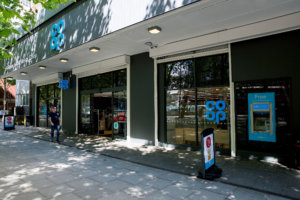Blockchain in the supermarkets! Co-op adopts Bitcoin database tech for food authenticity testing
Britian’s Co-op supermarket is trialing blockchain ledger technology in order to ensure that supermarkets and consumers can be sure that food labeling is correct. In conjunction with blockchain startup Provenance, the project hails what is being termed a “fairtrade digital age.” Far out, man.

Britain is, and has been for many years, the world’s leader in financial technology, especially within the institutional and banking sectors.
What began as fringe technologies are now being embraced by London’s multi-faceted FinTech boom, with several million dollars being poured into the development of blockchain by large institutions including Morgan Stanley, Goldman Sachs, Barclays, HSBC and even management consultancies such as PriceWaterhouseCoopers.
Although the origins of blockchain couldn’t be further removed from the plate glass corporate world of long-standing financial and banking entities, insofar as that instead of being founded by 19th century merchants with immaculately waxed moustaches and mahogany walking sticks forged from rainforest wood imported from the colonies, blockchain is the product of semi-anarchic members of the public whose virtual peer to peer currency Bitcoin, to which blockchain is inexorably linked, was initially invented in order to circumvent the very institutions that now embrace it.
Blockchain in terms of functionality is a continuously growing list of records which is secured from tampering or revision.
It consists of data structure blocks that may contain data or programs with each block holding batches of individual transactions and the results of any blockchain executables. Each block contains a timestamp and a link to a previous block. The blockchain database was originally designed in 2008 and first implemented in 2009 and is the main technical innovation of Bitcoin, where it serves as the public ledger for bitcoin transactions, and by nature cannot be separated from Bitcoin.
Bitcoin may be a folly, and has a chequered past littered with exchange demises, e-wallet hacks and criminal litigation against exchange owners and dark web marketplace operators, however the blockchain technology has forged a very stable and institutional future for the virtual currency, with massive venture capital interest from large mainstream firms having taken it to prosperity, including a record $116 million investment in blockchain technology developer 21 Inc two years ago.
In terms of how its original inventor may perceive its market popularity, it is rather like buying a Mars bar, opening it, throwing the Mars bar away and then keeping the wrapper.
Bank and professional services interest in blockchain has been commonplace for two years now, the technical development direction being toward automating certain bank tasks such as ledger, as well as cross border payment and settlement.
Today, a new sector has become interested in developing blockchain, that being retail food supermarkets in Britain.
The Co-op, one of Britain’s mainstream supermarkets, has begun exploring how blockchain technology can be used to prove the authenticity of its food, beginning with a project that sounds as though it was cultivated by festival-going hippies rather than technologists or supermarket industrialists – “fairtrade digital age”. Groovy (or whatever the parlance used by jostick-toting hemp-wearers is these days).
The supermarket is working with early stage blockchain startup Provenance to investigate how its technology can be used to track that its produce comes from sustainable sources in what’s thought to be the first trial of its kind by a major retailer.
Provenance, which is about to embark on a series A funding round after initial government funding, has just completed a pilot project proving the viability of blockchain’s distributed ledger technology for digitally tracking tuna through the supply chain – from catch to plate.
In this particular project, which essentially creates a publicly immutable ledger of transactions, supermarkets and consumers will be able to ensure that claims made on food labels are correct.
In addition, the company envisions the wider application for monitoring the provenance of other items such as fashion and is already in discussions with luxury retailers about potential use cases.
Provenance is also working with smaller firms, offering a type of plug and play service that lets shops and producers prove the artisanal or craft nature of their products by creating a digitally based history which consumers are able to view via a smartphone.
“Co-op is very progressive in view of what a supermarket should be, and is pioneering with blockchain in the same way that it has been with Fairtrade and most supermarkets are realizing that sustainability is an issue, whether that’s pressure from government or consumers, especially after something like the horsemeat scandal” said Provenance founder Jessi Baker on the launch of the project.
An interesting development, and yet another use for blockchain which further secures its future.









